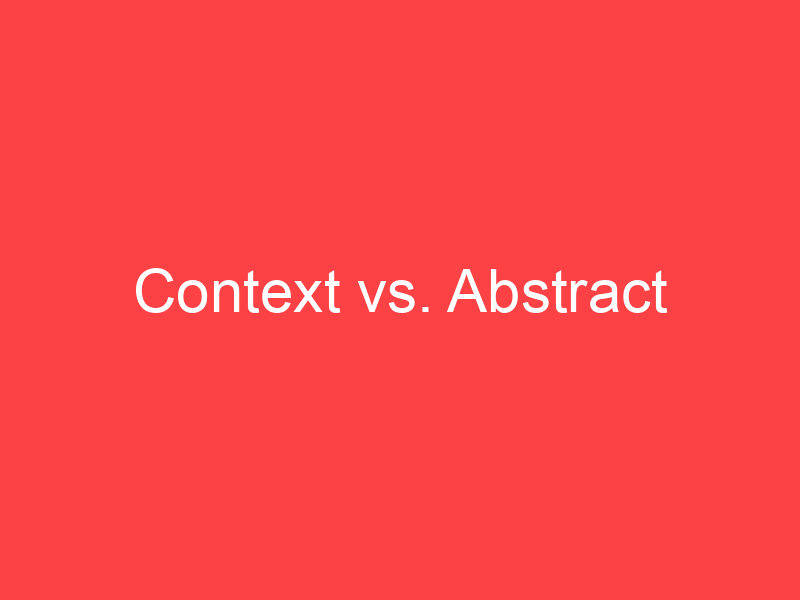-
Context (noun)
The surroundings, circumstances, environment, background or settings that determine, specify, or clarify the meaning of an event or other occurrence.
“In what context did your attack on him happen? – We had a pretty tense relationship at the time, and when he insulted me I snapped.”
-
Context (noun)
The text in which a word or passage appears and which helps ascertain its meaning.
-
Context (noun)
The surroundings and environment in which an artifact is found and which may provide important clues about the artifact’s function and/or cultural meaning.
-
Context (noun)
The trama or flesh of a mushroom.
-
Context (noun)
For a formula: a finite set of variables, which set contains all the free variables in the given formula.
-
Context (verb)
To knit or bind together; to unite closely.
-
Context (adjective)
Knit or woven together; close; firm.
-
Abstract (noun)
An abridgement or summary of a longer publication. First attested around 1350 to 1470.page=10
-
Abstract (noun)
Something that concentrates in itself the qualities of a larger item, or multiple items. First attested in the mid 16th century.
-
Abstract (noun)
Concentrated essence of a product.
-
Abstract (noun)
An abstract term; that which is abstract. First attested in the mid 16th century.
-
Abstract (noun)
The theoretical way of looking at things; something that exists only in idealized form. First attested in the early 17th century.
-
Abstract (noun)
An abstract work of art. First attested in the early 20th century.
-
Abstract (noun)
A summary title of the key points detailing a tract of land, for ownership; abstract of title.
-
Abstract (adjective)
Derived; extracted. Attested from around 1350 to 1470 until the late 15th century.
-
Abstract (adjective)
Drawn away; removed from; apart from; separate. First attested around 1350 to 1470.
-
Abstract (adjective)
Expressing a property or attribute separately of an object that is considered to be inherent to that object. First attested around 1350 to 1470.
-
Abstract (adjective)
Considered apart from any application to a particular object; not concrete; ideal; non-specific; general, as opposed to specific. First attested around 1350 to 1470.
-
Abstract (adjective)
Difficult to understand; abstruse; hard to conceptualize. First attested around 1350 to 1470.
-
Abstract (adjective)
Absent-minded. First attested in the early 16th century.
-
Abstract (adjective)
Pertaining to the formal aspect of art, such as the lines, colors, shapes, and the relationships among them. First attested in the mid 19th century.
-
Abstract (adjective)
Free from representational qualities, in particular the non-representational styles of the 20th century. First attested in the mid 19th century.
-
Abstract (adjective)
Absolute.
-
Abstract (adjective)
Insufficiently factual.page=8
-
Abstract (adjective)
Apart from practice or reality; vague; theoretical; impersonal; not applied.
-
Abstract (adjective)
As a noun, denoting an intangible as opposed to an object, place, or person.
-
Abstract (adjective)
Of a class in object-oriented programming, being a partial basis for subclasses rather than a complete template for objects.
-
Abstract (verb)
To separate; to disengage. First attested around 1350 to 1470.
-
Abstract (verb)
To remove; to take away; withdraw. First attested in the late 15th century.
-
Abstract (verb)
To steal; to take away; to remove without permission. First attested in the late 15th century.
-
Abstract (verb)
To summarize; to abridge; to epitomize. First attested in the late 16th century.
-
Abstract (verb)
To extract by means of distillation. Attested from the early 17th century until the early 18th century.
-
Abstract (verb)
To consider abstractly; to contemplate separately or by itself; to consider theoretically; to look at as a general quality. First attested in the early 17th century.
-
Abstract (verb)
To withdraw oneself; to retire. First attested in the mid 17th century.
-
Abstract (verb)
To draw off (interest or attention).
“He was wholly abstracted by other objects.”
-
Abstract (verb)
To perform the process of abstraction.
-
Abstract (verb)
To create abstractions.
-
Abstract (verb)
To produce an abstraction, usually by refactoring existing code. Generally used with “out”.
“He abstracted out the square root function.”

